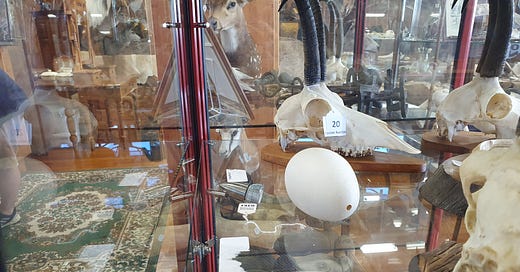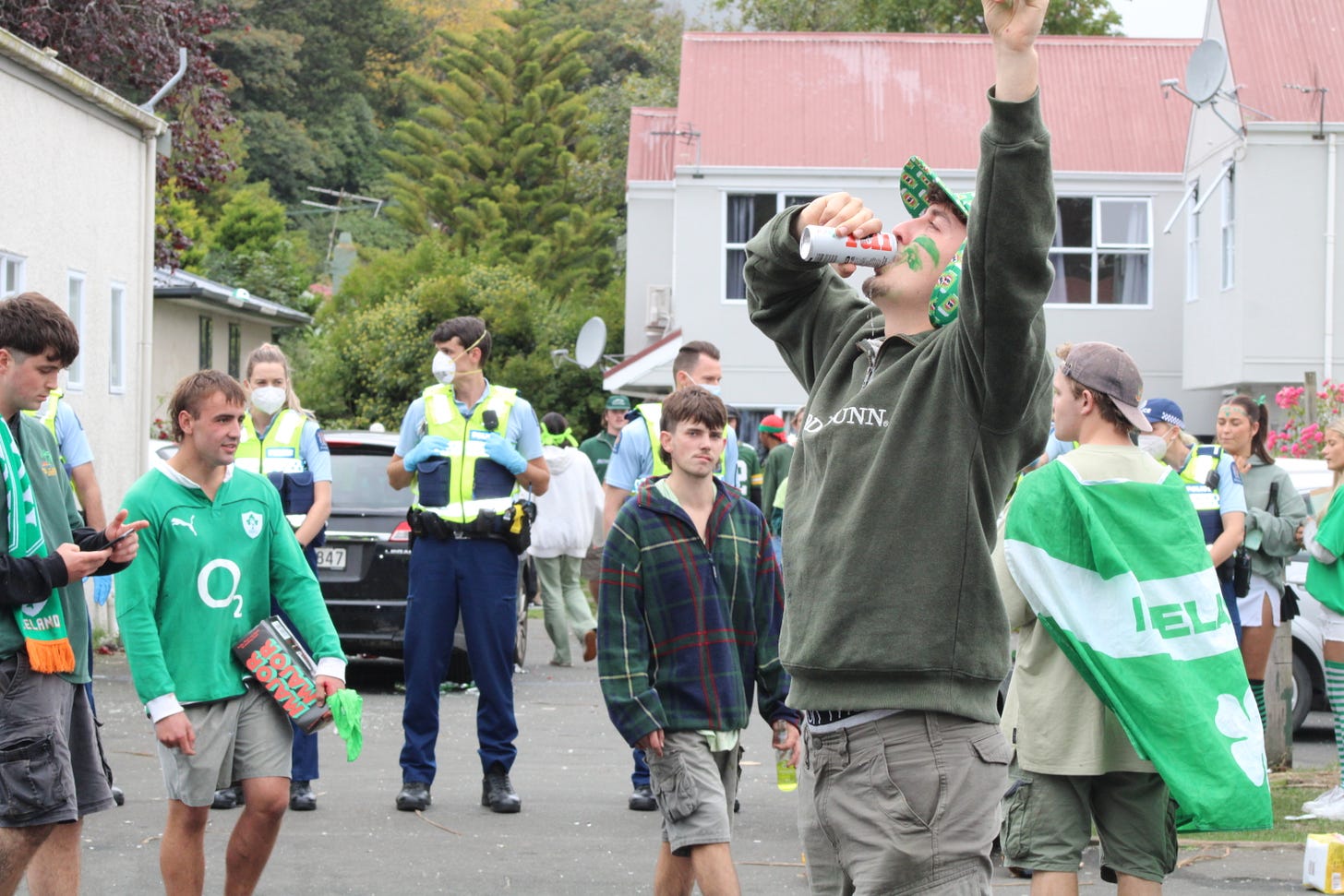I’ve got some good news this week, and it is all thanks to a loyal reader.
I got a tip-off about a ‘kiwi egg’ withdrawn from sale at a local auction house back in November. This is the result.
An investigation into the planned auction of the kiwi egg led to it being withdrawn while authorities questioned its authenticity.
That investigation, released under the Official Information Act, revealed that DNA proved the egg to be that of a black swan, the seller then slapped with a $400 infringement notice.
The incident unfolded at the George St premises of long standing Dunedin auction house, Proctor Auctions.
Among the bizarre items listed as part of the taxidermy auction for November 21, was a polar bear, a juvenile giraffe, a zebra, a leopard, and the ‘kiwi egg’.
That egg, listed as lot 351 with a starting bid of $80, but was later withdrawn from auction.
A file photo of Ronnie Proctor, of Proctor Auctions, with items from a previous auction. Photo: Hamish McNeilly
The Department of Conservation (DoC) told me that it was investigating the matter, but wasn’t able to comment further.
‘‘Our work at the moment is to determine the legality of the sale - so at present we can’t say for sure.’’
That stance changed this week, with DoC in a position to discuss the investigation.
Dylan Swain, DoC principal compliance officer (wildlife crime), said several members of the public contacted the department with concerns over the sale of a kiwi egg.
‘‘That’s when we started to look.’’
A Dunedin staff member went to the auction house, noting it was up for auction with a sign beside it saying ‘kiwi egg’, and later uplifted the egg to do some further investigation, he said.
Now you see it. Screenshot
That included an interview with the person who put it up for sale, with Swain revealing that seller was not actually entirely sure it was a kiwi egg.
‘‘It was kind of unusual, I would say that.’’
Swain was not able to provide details about the Central Otago-based seller, but confirmed he had other items listed at the November auction, ‘‘but none of them were a concern for us’’.
Ronnie Proctor, of Proctor Auctions, declined to comment when approached.
Swain said DOC was satisfied the egg was old, as opposed to the seller finding it in the wild in recent times.
The egg was taken to Otago Museum for further analysis, but that was inconclusive and the egg was then sent for DNA analysis at an Auckland lab, which includes bio-security specialists.
That analysis confirmed withdrawn lot 351 was actually a black swan egg, also a protected species, and not a kiwi egg.
The seller, who was known to DOC, was issued with a $400 infringement notice because he ‘‘really should have known better’’.
Swain said the man was surprised that the black swan was still a protected species, and thought it may have been a ‘goose egg’, which was not protected.
‘‘They fully accepted that ‘yes, it was a black swan’.’’
Now you don’t. Screenshot
Swain confirmed the seller chose not to give a full interview, which was within their rights.
‘‘It does seem to me that it could be a potentially easy thing to do . . . is sell a goose egg or a swan egg as a kiwi egg, and potentially make gain from that.’’
DoC could have pursued prosecution, but an infringement notice was the most appropriate action, he said.
The wording of that notice was: ‘‘Failed to comply with section 70G(1)(b)(ii) Wildlife Act 1953 by, without lawful authority, did dispose of any egg of any game, namely Cygnus Aratus, commonly known as Black Swan”.
While the egg had been blown-out it was still important to complete enforcement action to deter anyone from retrieving an item such as a kiwi egg from the bush and blowing out the foetus.
Swain said there was ‘‘no way of knowing’’ how much the auction would have fetched, but noted that Parliament had previously decided that $400 would be enough of a deterrent ‘‘to hopefully stop people from doing this’’.
DoC urged places such as auction houses to do their due diligence on any native items, but stressed the Dunedin auction house ‘‘was happy to help’’.
‘‘Some areas they don’t necessarily know the rules, things like elephant ivory are quite obvious to them, but natives not necessarily so because they just don’t see them . . . they are not supposed to be sold.’’
The department was still involved in investigating the sale of prohibited exotic items, including the sale of elephant ivory which was ‘‘a concern’’.
Meanwhile, the other exotic items sold at Proctor Auctions all had valid paperwork, he said.
Infringement notices had been used over the last 18 months by DoC, including cases of people importing exotic species/traditional medicines during the pandemic.
‘‘It is a lot easier tool than always having to take someone to court,’’ Swain said.
DoC introduce the system in September 2020, and by October 2021 - a month before the auction - approximately 250 infringement notices and 200 warning letters were issued with 11 offences referred for prosecution.
Around $85,000 has been paid in infringement fines, while the non-payment of fines were referred to the Ministry of Justice for recovery.
Some of you may recall when Covid swept through the student quarter, there were almost no locations of interests recorded, apart from a generic party in Castle St area.
But one address was specifically mentioned: 520 Castle St.
This is not a party house. Photo: Hamish McNeilly
Anyone who knows the area also knows that this is not some 24-hour party place. In fact it is a boarded-up building owned by the university.
I tried to get some info about how this happened, after it later slipped from the official list.
That included filing an Official Information Act request to the Ministry of Health, which they refused because ‘‘the information requested does not exist’’.
However it noted that this Location of Interest was initially published on the Ministry’s website at 4pm on 17 February 2022.
‘‘Exposure event information is gathered during case investigation, and it is important to note that sometimes information comes to light during this process which corrects the initial information provided.’’
The Location of Interest was removed from the Ministry of Health website at 7pm, after it was discovered it was an incorrect listing.
An actual picture of a Castle St Party. Photo: Hamish McNeilly
No written information was available as everything was done ‘‘In the interest of timeliness’’, the OIA said.
That involved phone calls between the National Investigation Tracing Centre and Public Health South, the responsible public health unit.
That clears that up.
What isn’t being cleared-up is graffiti around Dunedin (wearing my middle-aged curmudgeon hat on now).
I’m testing to see how long this artwork stays on a building in my area.
A Dunedin City Council spokesman said ‘‘we have also noticed an increase in graffiti recently’’.
Taskforce Green volunteers remove some of it, but we also use a commercial contractor for some council buildings.
If people want to report graffiti on public property, they could contact the DCC on 477 4000.
However council does not remove graffiti from private buildings but owners could still arrange private contractors to do this (I’m looking at you central Dunedin Countdown . . . )
And now for my Tweet of the Week, which was too easy (and keeping in theme)
I love the work Bruce is doing around Dunedin, please check out his Dunedin Museum of Natural Mystery. It is one of the city’s cooler attractions.
And this will be an attraction when it finally opens. Come for the jaw-dropping video (blue skies!) stay for the music.
If that music didn’t float your boat, or drive your car, or power your peddles. Try this from arguably the best named Dunedin band. George St Normal.
I’m still laughing about this personal ad in the ODT. I hope he finds love, so humble.
Last week I predicted it would be a big week for a certain councillor. You can read about Cr Lee Vandervis’ Court of Appeal case here.
It is also going to be a big week for council/iwi relations. WATCH. THIS. SPACE.
As always, if you have any tips, please send to hamish.mcneilly@stuff.co.nz













